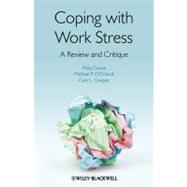
| Work stress and coping: Setting the scene | p. 1 |
| The term 'stress' | p. 2 |
| The costs of stress | p. 6 |
| Sickness absence | p. 8 |
| Labour turnover | p. 10 |
| Presenteeism | p. 11 |
| Work and mental health generally | p. 13 |
| The changing work context and work stressors | p. 15 |
| Work stressors: Some issues | p. 17 |
| Changing work stressors | p. 20 |
| Coping: The measurement debate | p. 24 |
| A history and some definitional issues surrounding coping | p. 25 |
| Defining coping and definitional issues | p. 28 |
| The measurement of coping | p. 32 |
| Coping checklists | p. 34 |
| Classifying coping and creating scales | p. 41 |
| New directions for coping research | p. 46 |
| New developments in appraisal | p. 47 |
| The influence of positive psychology | p. 51 |
| From positive psychology to proactive coping | p. 54 |
| Other developments in coping | p. 56 |
| Progress towards understanding coping effectiveness | p. 60 |
| From stress to emotions to positive emotions and coping | p. 63 |
| Coping with specific work-related stressors | p. 66 |
| Types of coping | p. 68 |
| Coping with work stressors | p. 73 |
| Coping strategies used by specific occupational groups | p. 87 |
| Future directions in research on coping with specific work stressors | p. 90 |
| Coping with work-life conflict | p. 95 |
| Social support | p. 97 |
| Personal control | p. 103 |
| Personal coping strategies | p. 105 |
| Organizational strategies to ameliorate work-life conflict | p. 113 |
| Conclusions | p. 119 |
| Stress management interventions | p. 121 |
| Conceptual framework for stress management interventions | p. 122 |
| Evaluating stress management interventions | p. 128 |
| Factors influencing the effectiveness of stress management interventions | p. 134 |
| Some guidelines for effective interventions | p. 138 |
| Conclusions | p. 143 |
| Coping with work stress: An agenda for the future | p. 145 |
| Continuing debates: Emerging context | p. 146 |
| Building a future research agenda from the themes of the past | p. 149 |
| The characteristics of coping and coping types | p. 150 |
| Assessment of coping behaviours | p. 151 |
| Coping styles versus coping strategies | p. 153 |
| The role of meaning in coping research | p. 155 |
| Coping effectiveness | p. 156 |
| Personal coping versus organizational stress management interventions | p. 158 |
| From stress to well-being | p. 160 |
| Conclusions | p. 161 |
| References | p. 163 |
| Index | p. 187 |
| Table of Contents provided by Ingram. All Rights Reserved. |
The New copy of this book will include any supplemental materials advertised. Please check the title of the book to determine if it should include any access cards, study guides, lab manuals, CDs, etc.
The Used, Rental and eBook copies of this book are not guaranteed to include any supplemental materials. Typically, only the book itself is included. This is true even if the title states it includes any access cards, study guides, lab manuals, CDs, etc.